Aggregated News

Americans have celebrated the fact that the Biden administration is embracing science and returning the country to evidence-based policymaking. We agree that science should guide policy—except in cases where it wouldn’t assist people to live their lives but would, instead, exclude them.
The CRISPR-Cas9 gene-editing technology, for which biochemists Jennifer Doudna and Emmanuelle Charpentier won the Nobel Prize in Chemistry, has the potential to do just that. So do other forms of scientific technologies. We should therefore always be aware of the ethical choices these technologies can pose.
In the case of CRISPR, those choices are complex. CRISPR has many functions; one of these is that it can be used to treat disease. Yet the far-reaching, more fraught promise of this technology—one about which scientists seem at once excited and cautious—lies in its ability to eliminate from the gene pool what medical science identifies as faulty or abnormal genes that cause difference in individual people. Certainly, goes the logic of CRISPR’s promise, the goal of ridding future generations of terrible diseases that cause suffering and death and deplete resources...



